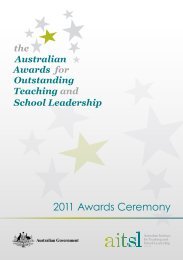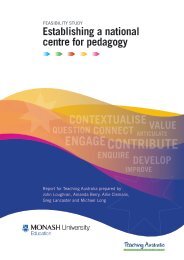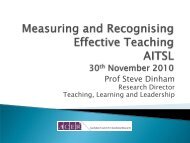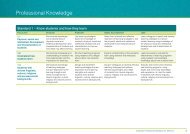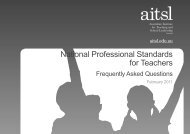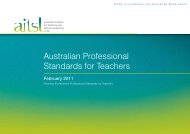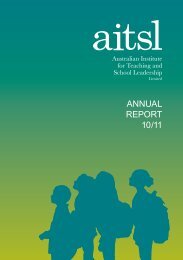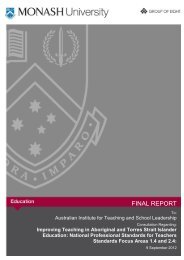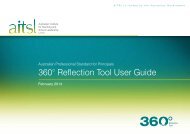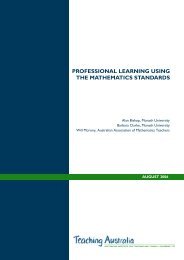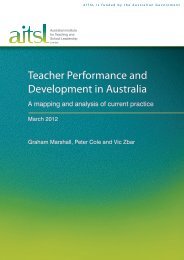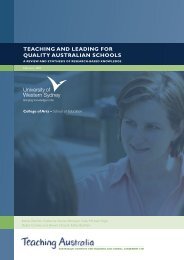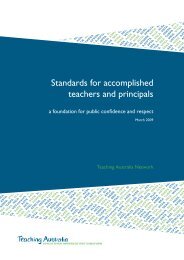2007; Gruenert 2005; Printy 2008; Scheerens 2010; Vescio, Ross, and Adams 2008), though theireffectiveness depends on the extent to which their use matches the research on successful features,strategies and conditions discussed above. For instance, Graham (2007) found that the success ofPLCs depended on the leadership and organisational practices which supported it, the extent to whichteam meetings engaged positively in dialogue about action (lesson plans, student work, assessment,etc.), and the development of community among teams. Printy (2008) found that, in US high schools,the strength of departmental chairs was the most influential factor in determining the quality of teachers’participation in communities of practice.Features of successful PLCs are widely reported in the literature (Stoll, Bolam, McMahon, WallaceandThomas 2006), and to a large extent reflect the features of successful PL in general:• Shared values and visionUnity of purpose and a clear agreement about the school mission was one of the three strongestcorrelations with effective collaborative schools in Gruenert’s (2005) study. Doecke et al. (2008,p. 9) also point to the importance of teams having ‘a shared vision of the capabilities of studentsand teachers’.• Collective responsibilityTaking responsibility for results and outcomes, and for professional learning (both individual andcollective), are a key feature of successful PLCs (Bolam, McMahon, Stoll, Thomasand Wallace2005). Doecke et al. (2008, p. 9) recommend that, ‘Team members should have shared andappropriately differentiated responsibilities based on their experience and knowledge levels.There should be a mutual accountability for student achievement among all members of thelearning team’.• Effective leadershipBoth shared leadership and organisational support from principals are important. Doecke et al.(2008, p. 10) observe that, ‘Successful teams are supported by their school leaders who build aclimate of openness and trust in the school, empower teams to make decisions based on studentneeds, and apply appropriate pressure to perform’.• Reflective professional inquiryActive deconstruction of knowledge through reflection and analysis is combined with itsreconstruction through action in a particular context as well as co-construction throughcollaborative learning with peers (Stoll et al., 2006,p. 233). Gruenert (2005) found that teachersvaluing the idea of themselves as learners was one of the three most important features ofsuccessful collaborative schools.• A sound knowledge baseStoll et al. (2006, p 232) observe that, ‘A PLC cannot be built solely through providing professionaldevelopment opportunities for staff. Nevertheless, if the community is to be intellectuallyvigorous, members need a solid basis of expert knowledge and skills, strongly emphasising theprofessionalisation of teachers’ work through increasing expert knowledge’. Dede (2003) identifiesdiversity of expertise among members as important.• CollaborationGroup as well as individual learning is promoted, especially around evidence: ‘the school learningcommunity interacts, engages in serious dialogue and deliberates about information and data,interpreting it communally and distributing it among them’ (Stoll et al. 2006, p. 227).• Trust and positive working relationshipsOpenness, mutual trust, respect and support are keys to successful teams (Bolam et al. 2005).15 <strong>Professional</strong> <strong>Learning</strong> <strong>Flagship</strong> <strong>Program</strong>: <strong>Leading</strong> <strong>Curriculum</strong> <strong>Change</strong>: Literature Review
• Work-basedBased on self-development and work-based learning through tools such as coaching, mentoringand peer-assisted learning.• Community partnershipsGruenert’s (2005) study identified relationships with parents as a key feature of successfulcollaborative schools.Bolam et al. (2005, p. i) conclude that ‘PLCs are created, managed and sustained through four keyoperational processes: optimising resources and structures; promoting individual and collective learning;explicit promotion and sustaining of an EPLC [educational PLC]; and leadership and management’.Effective group processes are crucial to PLCs, but these processes require particular expertise whichcannot be taken for granted. As Trotman (2009, p. 352) observes:... network participants are often unprepared for, and are then frustrated by, group tensionsresulting from an inattention to group processes. Moreover, our observations lead us to believe thatan understanding and assimilation of change management processes is crucial to the developmentof strategic intelligence in network practices, and that it is only amongst a small minority ofparticipants that this is recognised and valued as important professional expertise..... networks that develop and integrate a strong sense of strategic ‘withitness’ (where roledefinition, developmental sequence, conceptions of community and management of changeprocesses are fully attended to) have a considerable advantage in developing meaningfulcollaborative partnerships over those that do not. This requires the acquisition of professionalexpertise in hitherto under-developed areas: tolerance of role flexibility, sensitivity to the pulses inmicro-political power in new educational contexts, and a personal commitment to the obligationsof community participation amongst institutions. Expertise of this sort necessarily involves adeep knowledge of self, trust in professional intuition and alertness to the anxiety-provokingcharacteristics of change.Online PLCs share the general aspects of the potential and the challenges of PLCs outlined above.Particular advantages lie in the capacity in online communities for both synchronous and asynchronouscommunication (Fulton, Doerr, and Britton 2010). This has been found to positively affect participationand individual learning (Dede 2003). However, there are particular challenges as well. For instance,online platforms are built as generic frameworks, yet need to be responsive to particular teams andcontexts. Barab, MaKinster, and Scheckler(2003, p. 242) suggest this requires a minimalist design ‘...to create a tentative platform and then facilitate the community in growing and evolving its own space, aprocess that involves walking the tightrope between designing the community and allowing it to emergefrom the needs and agendas of its members’. Fulton, Doerr and Britton (2010) cite studies which foundthat developing supportive and shared leadership in the online environment was a particular need.<strong>Professional</strong> learning communities offer clear potential for successful PL. On the other hand, they are nosilver bullet. Like PL and educational change in general, they face the challenges of local agendas andreversion to conventional practice. However, as a means of providing engaging PL and as a basis forcontinuing school improvement, especially when tied to the possibilities of scale in online provision, theyoffer the most likely avenue for successful professional learning at the present time.<strong>Professional</strong> <strong>Learning</strong> <strong>Flagship</strong> <strong>Program</strong>: <strong>Leading</strong> <strong>Curriculum</strong> <strong>Change</strong>: Literature Review 16
- Page 1 and 2: Professional Learning FlagshipProgr
- Page 3 and 4: ContentsIntroduction ..............
- Page 5 and 6: Curriculum change: Implications for
- Page 7 and 8: Table 1: Overview of factors affect
- Page 9 and 10: This emphasis on capacity-building
- Page 11 and 12: Much of the foregoing discussion is
- Page 13 and 14: Features of successful professional
- Page 16 and 17: p. 1051) conclude that, ‘Findings
- Page 20 and 21: RecommendationsProfessional learnin
- Page 22 and 23: impersonal relationships• rationa
- Page 24 and 25: • The organisational goals are di
- Page 26 and 27: Table 2: Two views of teacher leade
- Page 28 and 29: A range of specifications and stand
- Page 30 and 31: In secondary schools, teacher leade
- Page 32 and 33: 1. Stimulus for innovation — Why
- Page 34 and 35: Table 4: Elements and processes of
- Page 36 and 37: The education of Indigenous student
- Page 38 and 39: ReferencesAinscow, M. (2005). Devel
- Page 40 and 41: Daly, A. J. (2009). Rigid Response
- Page 42 and 43: Hall, R. (1997). Knowledge Use and
- Page 44 and 45: Meirink, J., Meijer, P., Verloop, N
- Page 46 and 47: Thorpe, R., and Gold, J. (2010). Le
- Page 48: aitsl.edu.auFurther informationTele



